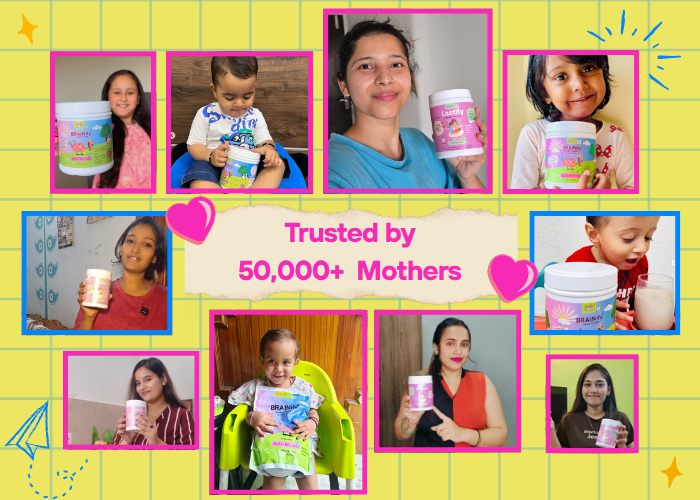How to Ensure Proper Nutrition While Breastfeeding: A Mom’s Guide to Boosting Milk Supply and Energy
Why Nutrition Matters After Delivery
Maintaining a healthy diet after giving birth is equally as crucial as it was throughout pregnancy. The body of a mother undergoes significant physical and emotional changes, and a nutritious diet promotes quicker recovery, energy restoration, and overall well-being. Nutrition has a direct impact on the supply and quality of breast milk, ensuring the infant receives vital vitamins and minerals that support growth and brain development. Nutrient-rich foods like whole grains, proteins, leafy greens, and healthy fats not only help in recovery but also boost immunity, balance hormones, and reduce postpartum fatigue. Eating well after childbirth supports both the mother’s health and the baby’s nourishment, while also maintaining a consistent, high-quality milk supply increase.
7 Nutrition Tips for Lactating Moms
-
Focus on Balanced Meals
A colorful, balanced thali ensures both mother and baby get essential nutrients. Include whole grains, legumes, lean proteins, healthy fats, fruits, vegetables, and dairy. Regular, nutrient-rich meals not only help mothers recover but also increase breast milk quality, ensuring steady breastfeeding success.
-
Stay Hydrated
Hydration is essential since breast milk is mostly water. Include hydrating foods such as watermelon, cucumber, soups, coconut water, and buttermilk along with 8–12 glasses of water daily. Adequate hydration promotes naturally boosting milk supply, prevents fatigue, and supports steady energy during repeated nursing sessions.
-
Eat Iron-Rich Foods
Iron depletion during childbirth might lead to fatigue and low stamina. Add spinach, beetroot, dates, jaggery, fenugreek, and rajma to your meals. Pair them with Vitamin C sources like lemon or amla for better absorption. Healthy iron levels support maternal energy, hemoglobin production, and improve the quality of breast milk supply for the baby’s growth and brain development.
-
Include Calcium & Vitamin D
Calcium is vital for strong bones, healthy lactation, and milk quality. Sources include milk, curd, ragi, sesame seeds, and paneer. Vitamin D, essential for calcium absorption, comes from sunlight, fortified foods, or supplements. Together, they maintain the mother’s bone health while ensuring the baby receives calcium through breastfeeding for growth and brain support.
-
Prioritize Protein
Protein fuels wound healing, restores strength, and promotes milk supply increase. Include soybeans, eggs, poultry, fish, moong dal, and chana dal daily. Plant-based protein from traditional foods like besan chilla or sattu drinks also works well. Adequate protein improves breast milk supply and provides long-lasting energy for both mother and baby.
-
Healthy Fats for Hormones
Good fats support maternal hormones and baby’s brain development. Add 1-2 teaspoons of ghee, cold-pressed oils like coconut or mustard, nuts like walnuts and almonds, and seeds like chia and flax. These fats improve milk quality and maintain hormonal balance postpartum.
-
Galactagogue Foods (Milk Boosters)
Some traditional foods act as natural galactagogues, helping naturally boost milk supply. Popular choices include Shatavari, Moringa, Safed Jeera, and Fenugreek (Methi). Consuming these regularly, either through diet or a breast milk supply boost supplement, can significantly increase breast milk volume and quality. Lactation supplements that combine these herbs offer an easier, more effective way to support mothers in their breastfeeding journey.
Foods to Avoid While Breastfeeding
While most foods are safe, some can affect the baby or reduce milk quality:
1. Excess Caffeine
High caffeine intake can make babies fussy, jittery, or affect their sleep. Limit coffee, tea, energy drinks, or chocolate to 1–2 cups or servings a day. If you consume caffeine, try to breastfeed before drinking so the levels in milk are lower during feeding.
2. Artificial Sweeteners
Some artificial sweeteners, such as saccharin or aspartame, can pass into breast milk in small amounts. While occasional consumption is generally considered safe, excessive use may affect your baby’s developing taste preferences or digestive system. Limiting artificial sweeteners and choosing natural alternatives is often recommended for breastfeeding mothers.
3. Processed and Junk Foods
Desserts, packaged snacks, fried foods, and sugary drinks don't provide much nutrients. Excessive consumption can affect your energy levels and the quality of breast milk. Focus on whole, nutrient-dense foods to support both your recovery and your baby’s growth.
4. Spicy or Gas-Producing Foods
Certain foods such as onion, garlic, cabbage, chili, and legumes may cause gas, colic, or mild digestive discomfort in some babies. Observe your baby's reaction to these foods as you introduce them gradually, and make any necessary dietary adjustments.
5. Alcohol
Alcohol can have an impact on your baby's feeding, sleep habits, and development since it enters breast milk. If you choose to drink, wait at least 2–3 hours per standard drink before breastfeeding, or pump and discard milk in advance.
In Summary
Breast milk is nature’s perfect food for your baby, but your body needs extra fuel to produce it. According to WHO, a lactating mother needs an additional 500 calories per day compared to pre-pregnancy requirements. These extra calories should come from nutrient-rich foods, not empty calories. By following a balanced diet, staying hydrated, and including essential nutrients, mothers can support both their recovery and their baby’s growth. Along with good nutrition, a lactation supplement or breast milk supply boost supplement can help increase breast milk production and ensure a steady milk supply increase. With the right lifestyle and support, mothers can naturally boost milk supply and make their breastfeeding journey smoother and more fulfilling.







